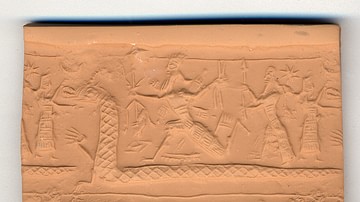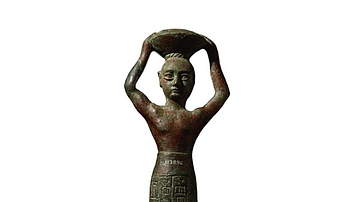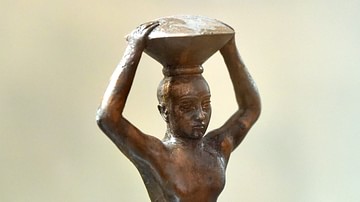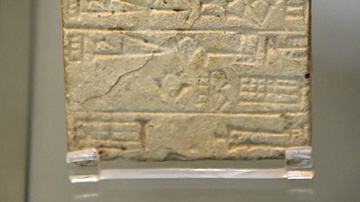Search
Did you mean: Yamm?
Remove Ads
Advertisement
Summary 
Loading AI-generated summary based on World History Encyclopedia articles ...
Search Results

Definition
Code of Ur-Nammu
The Code of Ur-Nammu (c. 2100-2050 BCE) is the oldest extant law code in the world. It was written by the Sumerian king Ur-Nammu (r. 2047-2030 BCE) or his son Shulgi of Ur (r. 2029-1982 BCE) centuries before the famous Code of Hammurabi was...

Definition
Ur-Nammu
Ur-Nammu (r. 2047-2030 BCE) was the founder of the Third Dynasty of Ur in Sumer who initiated the so-called Ur III Period (2047-1750 BCE) also known as the Sumerian Renaissance. He is best known as the king who composed the oldest extant...

Article
The Death of Ur-Nammu
The Death of Ur-Nammu is a Sumerian lament over the passing of the king Ur-Nammu (r. 2047-2030 BCE), founder of the Third Dynasty of Ur, who was killed in battle fighting the Gutians in 2030 BCE. The poem is frequently cited for its depiction...

Definition
Code of Hammurabi
The Code of Hammurabi was a set of 282 laws inscribed in stone by the Babylonian king Hammurabi (r. 1795-1750 BCE) who conquered and then ruled ancient Mesopotamia. Although his law code was not the first, it was the most clearly defined...

Definition
Tiamat
Tiamat is the Mesopotamian goddess associated with primordial chaos and the salt sea best known from the Babylonian epic Enuma Elish. In all versions of the myth, following the original, Tiamat always symbolizes the forces of chaos, which...

Image
Foundation figure of Ur-Nammu
From Uruk, southern Iraq Third Dynasty of Ur, about 2100-2000 BC. The king as a temple builder with a basket of earth to make bricks. This bronze figure represents Ur-Nammu, the ruler of Ur (about 2112-2095 BC). It was made for burial...

Image
Foundation Figurine of Ur-Nammu
This bronze statuette was found at the foundation deposits of the temple of Eanna at Nippur. The statue depicts Ur-Nammu, king of Ur, holding a basket on his head as the builder of the temple. Ur III (Neo-Sumerian) period, reign of Ur-Nammu...

Image
Law Code of King Ur-Nammu
This law code is considered the oldest known law code surviving today. Many terracotta tablets of this law code have been excavated at several archaeological sites in Mesopotamia. This tablet was found at Nippur (modern Nuffar, Al-Qadisiyah...

Image
Foundation Tablet of Ur-Nammu from Ur
This is a stone tablet, inscribed with a cuneiform text. This was a dedication to the Temple of Nin-Sun at Ur by Ur-Nammu. Ur-Nammu was king of Ur III dynasty. From Southern Mesopotamia, modern-day Iraq. Neo-Sumerian Period, reign of Ur-Nammu...

Image
Ur-Nammu
Ur-Nammu (seated) bestows governorship on Ḫašḫamer, patesi (high priest) of Iškun-Sin (cylinder seal impression, c. 2100 BCE). Greenstone seal(clay impression of the cylinder seal) of Hashhamer, Governor of Ishkun-Sin. Third Dynasty...